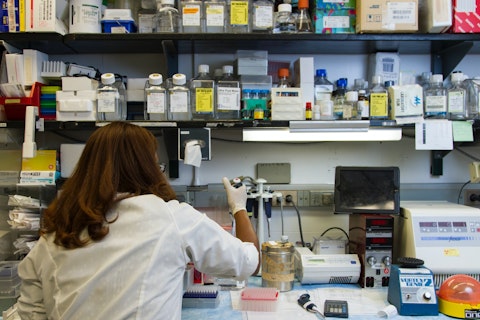In this article, we will take a look at some of the best defensive dividend stocks to invest in.
US healthcare stocks have been under mounting pressure this year, largely due to policies introduced by the Trump administration. Despite the challenges, some investors believe the recent sell-off has made these stocks too attractive to ignore.
As of October 14, the S&P 500 health care sector— which includes pharmaceuticals, biotech firms, health insurers, and medical equipment companies— has gained just 3.46%, trailing the broader market’s nearly 14% return. Concerns over efforts to align US drug prices with international levels, tariffs on pharmaceuticals, and funding cuts for health research and Medicaid have all weighed on the sector’s performance.
However, earlier in October, both US and European healthcare stocks rallied after Pfizer reached an agreement with President Trump to lower prescription drug prices under the Medicaid program in return for tariff relief. The deal, viewed as less severe than initially feared, offered some relief and clarity to global drugmakers following a turbulent year marked by regulatory pressure and uncertainty over pricing policies. Given the current scenario, we will take a look at some of the best dividend stocks in the healthcare sector.

Our Methodology
For this article, we used a screener to identify defensive healthcare stocks with stable business models and sound financials. From that list, we chose dividend healthcare stocks with a strong track record of paying dividends to shareholders, which makes them resilient in the current environment. The stocks are ranked according to their dividend yields as of October 14.
Why are we interested in the stocks that hedge funds pile into? The reason is simple: our research has shown that we can outperform the market by imitating the top stock picks of the best hedge funds. Our quarterly newsletter’s strategy selects 14 small-cap and large-cap stocks every quarter and has returned 427.7% since May 2014, beating its benchmark by 264 percentage points (see more details here).
11. Eli Lilly and Company (NYSE:LLY)
Dividend Yield as of October 14: 0.74%
Eli Lilly and Company (NYSE:LLY) is an American multinational pharmaceutical company. The stock has surged by over 4% since the start of 2025.
Erste Group raised its rating on Eli Lilly and Company (NYSE:LLY) from Hold to Buy on October 13, citing the company’s strong performance during the first half of the year. The upgrade followed Eli Lilly’s decision to boost its full-year 2025 outlook for both revenue and earnings per share after reporting impressive mid-year results.
The drug maker now expects annual revenue between $60 billion and $62 billion, with earnings per share projected to fall between $21.80 and $23.00. According to Erste Group, the recently announced tariffs are expected to have only a limited effect, with those impacts already reflected in the company’s updated guidance. The firm also anticipates that Eli Lilly and Company (NYSE:LLY) will continue gaining market share within the pharmaceutical industry.
Eli Lilly and Company (NYSE:LLY) remains a favorite among dividend investors, having raised its dividend for 11 consecutive years. The company’s quarterly dividend comes in at $1.50 per share and has a dividend yield of 0.74%, as of October 14.
10. Cardinal Health, Inc. (NYSE:CAH)
Dividend Yield as of October 14: 1.33%
An American multinational healthcare services company, Cardinal Health, Inc. (NYSE:CAH) is among the best dividend stocks in the defensive healthcare sector.
On September 30, Cardinal Health, Inc. (NYSE:CAH) revealed plans to build a new flagship forward distribution center in Indianapolis, Indiana, aimed at expanding and modernizing its national pharmaceutical distribution network. The facility will incorporate advanced automation and cutting-edge technology to support the daily distribution of over 70,000 pharmaceutical and specialty products across the US.
Debbie Weitzman, CEO, Pharmaceutical & Specialty Solutions segment at Cardinal, made the following comment:
“We’re continuing to make strategic investments in our core distribution network to drive service, enhance efficiency, and meet the evolving needs of our customers with even greater reliability and responsiveness. Expanding and modernizing our distribution footprint reinforces our ability to drive growth and support our teams.”
This marks Cardinal Health, Inc. (NYSE:CAH)’s second pharmaceutical distribution center announcement since 2024. The Indianapolis facility is expected to be fully operational by fall 2027 and will create more than 100 new jobs in the state, which serves as an important logistics hub for the company.
Beyond its expansion plans, Cardinal Health, Inc. (NYSE:CAH) also stands out for its financial consistency, having increased its dividend for 39 consecutive years. Currently, it offers a quarterly dividend of $0.5107 per share and has a dividend yield of 1.33%, as of October 14.
9. The Cigna Group (NYSE:CI)
Dividend Yield as of October 14: 2.00%
The Cigna Group (NYSE:CI) is an American multinational company that provides managed healthcare and insurance services.
On October 14, Goldman Sachs analyst Scott Fidel initiated coverage of The Cigna Group (NYSE:CI) with a Buy rating and a price target of $370. In his note, he stated that the managed care sector is experiencing its steepest underwriting downturn in more than 15 years. Goldman Sachs recommends greater exposure to Medicare Advantage, anticipating a margin recovery phase starting in 2026, though it expects that rebound to vary across the industry. The firm also projects a slower recovery for Medicaid and the healthcare exchange markets.
The Cigna Group (NYSE:CI) has also drawn investor interest after Wells Fargo raised its price target on the stock to $354 from $340 on October 7 while maintaining an Equal Weight rating. The firm made this adjustment as part of its updated outlook for the sector ahead of Q3 2025 earnings, noting that the extension of enhanced subsidies now seems more probable.
The Cigna Group (NYSE:CI) continues to appeal to income-focused investors as well, with the company having raised its dividend for five consecutive years. It currently offers a quarterly dividend of $1.51 per share and has a dividend yield of 2.00%, as of October 14.
8. UnitedHealth Group Incorporated (NYSE:UNH)
Dividend Yield as of October 14: 2.45%
UnitedHealth Group Incorporated (NYSE:UNH) is a diversified healthcare company that provides insurance services in the US through its UnitedHealthcare segment and operates internationally through its Optum division.
On October 10, Cantor Fitzgerald reaffirmed its Overweight rating on UnitedHealth Group Incorporated (NYSE:UNH) with a price target of $440. The firm anticipates that the company will see the largest year-over-year bonus increase as it returns to its long-term target range of 2% to 4%, up from 2% to 2.5% in 2025.
According to Cantor Fitzgerald, UnitedHealth Group Incorporated (NYSE:UNH) could see a $368 million boost in bonus revenue, driven by 78% of its members being enrolled in 4-Star plans. The company also led the 4.5-Star improvement, with membership expected to rise to 41% in 2026 from 12% in 2025.
UnitedHealth Group Incorporated (NYSE:UNH)’s solid financial position has supported 14 consecutive years of dividend growth. The company currently pays a quarterly dividend of $2.21 per share for a dividend yield of 2.45%, as of October 14.
7. Johnson & Johnson (NYSE:JNJ)
Dividend Yield as of October 14: 2.74%
Johnson & Johnson (NYSE:JNJ) is an American multinational pharmaceutical, biotech, and medical technologies company.
On October 14, the company announced that it will spin off its orthopedics division into a separate company within the next 18 to 24 months. This move marks its second major spin-off in two years as the healthcare giant continues to shift focus toward higher-growth segments.
Johnson & Johnson (NYSE:JNJ) also shared an optimistic outlook for 2026, supported by new drug launches and an expanding medical devices portfolio. J&J expects revenue growth to surpass 5% next year, above analysts’ forecasts of 4.6%, and projects adjusted earnings to exceed Wall Street’s estimate of $11.39 per share by up to 5 cents.
The orthopedics business, which produces implants for hips, knees, and shoulders as well as surgical instruments and related devices, generated about $9.2 billion in revenue last year, roughly 10% of the company’s total sales. After the separation, the new company will be called DePuy Synthes and led by industry veteran Namal Nawana.
In 2023, Johnson & Johnson (NYSE:JNJ) launched a two-year restructuring plan for its orthopedics unit, including market exits and product discontinuations, shortly after spinning off its $15 billion consumer health business into Kenvue.
Despite these major transformations, Johnson & Johnson (NYSE:JNJ) has continued to uphold its strong dividend tradition, having raised its payouts for 63 consecutive years. The company offers a quarterly dividend of $1.30 per share and has a dividend yield of 2.74%, as of October 14.
6. AbbVie Inc. (NYSE:ABBV)
Dividend Yield as of October 14: 2.86%
A global pharmaceutical company, AbbVie Inc. (NYSE:ABBV) is among the best dividend stocks in the healthcare sector.
On October 14, Cantor Fitzgerald reaffirmed its Overweight rating and $250 price target for AbbVie Inc. (NYSE:ABBV) while revising its earnings model to include the tax effects of a planned In-Process Research and Development (IPR&D) charge. The research firm lowered its Q3 2025 EPS estimate from $2.06 to $1.82, compared with AbbVie’s guidance range of $1.74 to $1.78, to factor in the $1.50 per share after-tax impact of the charge.
Cantor also raised its expected tax rate for the quarter to around 25%, up from about 16%, explaining that its earlier projections had incorrectly assumed partial tax shielding on the expense. According to the firm, the $2.68 billion IPR&D charge AbbVie Inc. (NYSE:ABBV) has outlined is not tax deductible, bringing the company’s Q3 tax rate roughly in line with previous quarters.
Aside from the tax-related revisions, Cantor left the rest of its forecasts unchanged, including all other operating assumptions.
AbbVie Inc. (NYSE:ABBV) remains recognized as a reliable dividend payer, having achieved 53 consecutive years of dividend growth. The company’s quarterly dividend comes in at $1.64 per share and has a dividend yield of 2.86%, as of October 14.
5. Medtronic plc (NYSE:MDT)
Dividend Yield as of October 14: 2.95%
Medtronic plc (NYSE:MDT) is recognized as the world’s largest manufacturer of biomedical devices and implantable technologies. The company operates through four primary divisions: Cardiovascular, Neuroscience, Medical Surgical, and Diabetes.
On October 9, Stifel raised its price target on Medtronic plc (NYSE:MDT) from $90.00 to $105.00 while keeping a Hold rating, following a visit to the company’s Boston HUGO soft tissue surgical robotic facility. The firm mentioned that Medtronic appears “confidently ready” from supply-chain, manufacturing, and physician support standpoints to introduce its HUGO robotic system in the US, pending expected FDA approval by the end of fiscal 2026 (April). The company’s strong financial position further strengthens its expansion prospects.
The event offered investors a detailed look at the development of the HUGO system, including live demonstrations of Medtronic plc (NYSE:MDT)’s digital ecosystem technologies and an interactive Q&A session with the company’s management team.
Stifel noted that Medtronic intends to adopt “a deliberate and thoughtful approach” when introducing the HUGO system to the US market after receiving FDA approval.
In addition, Medtronic plc (NYSE:MDT) dividend adds to its investment appeal. The company is close to achieving Dividend King status, with 48 straight years of dividend increases.
4. Amgen Inc. (NASDAQ:AMGN)
Dividend Yield as of October 14: 3.23%
Amgen Inc. (NASDAQ:AMGN) is a California-based biopharmaceutical company.
On October 3, Oppenheimer reaffirmed its Outperform rating on Amgen Inc. (NASDAQ:AMGN) with a price target of $380. The firm highlighted Amgen’s solid performance and also reported that its VESALIUS-CV trial reached both of its primary goals, showing that adding Repatha to standard lipid-lowering treatments significantly reduced cardiovascular events in high-risk patients with no previous history of heart attack or stroke.
Oppenheimer stated that the trial results were both statistically and clinically meaningful, meeting all key composite endpoints, and noted that no new safety issues emerged.
Amgen Inc. (NASDAQ:AMGN) recently entered the direct-to-consumer market, announcing plans to sell Repatha at a cash price that is 60% lower than its current list price before insurance or rebates. This move aligns with broader industry efforts to make medications more accessible amid ongoing political pressure to reduce US drug costs.
From a financial perspective, Amgen Inc. (NASDAQ:AMGN) continues to draw investor interest for its reliable dividend growth, having raised its payouts for 14 consecutive years. As of October 14, the stock has a dividend yield of 3.23%.
3. CVS Health Corporation (NYSE:CVS)
Dividend Yield as of October 14: 3.35%
CVS Health Corporation (NYSE:CVS), an American multinational healthcare company, received renewed confidence from Cantor Fitzgerald on October 10, as the firm reaffirmed its Overweight rating on the stock. The stock has surged by over 80% since the start of 2025.
According to the research note, the slight drop in the company’s Medicare Advantage Star ratings was “more positive than feared” and represented “the largest upside in ratings” among peers. Cantor Fitzgerald expects a favorable market reaction, pointing out that CVS has maintained over 80% of its ratings at high levels.
The firm added that earlier in the quarter, concerns had arisen overCVS Health Corporation (NYSE:CVS)’s ability to sustain its strong position in the Medicare Star Ratings program, which plays a critical role in determining reimbursement rates and enrollment opportunities for Medicare Advantage plans. These ratings are particularly important for CVS, as its Medicare Advantage business makes up a large portion of its healthcare benefits division.
CVS Health Corporation (NYSE:CVS)’s dividend also continues to attract investor attention, with the company maintaining a consistent payout record since 1997. The company’s quarterly dividend comes in at $0.665 per share and has a dividend yield of 3.35%, as of October 14.
2. Merck & Co., Inc. (NYSE:MRK)
Dividend Yield as of October 14: 3.81%
Merck & Co., Inc. (NYSE:MRK) is a global pharmaceutical company recognized for its strong oncology lineup, led by its flagship drug Keytruda, the top-selling medicine in the world. The company also produces treatments for diabetes, as well as vaccines for HPV and chickenpox.
In recent years, Merck & Co., Inc. (NYSE:MRK) has been actively expanding through acquisitions. During 2024, it purchased Harpoon Therapeutics, Abceutics, EyeBio, and Modifi Biosciences. In 2025, it followed up with the $3.4 billion acquisition of SpringWorks Therapeutics. The company is also navigating a leadership transition.
Analysts remain optimistic about Merck & Co., Inc. (NYSE:MRK) outlook. On October 13, Citi resumed coverage of MRK with a Neutral rating and raised its price target to $95 from $84. The firm highlighted Keytruda Qlex, Winrevair, and Merck’s broader drug pipeline as key areas of investor focus.
Merck & Co., Inc. (NYSE:MRK) also stands out for its consistent dividend growth, having raised its payouts for 16 consecutive years. The company pays a quarterly dividend of $0.81 per share and has a dividend yield of 3.81%, as of October 14.
1. Bristol-Myers Squibb Company (NYSE:BMY)
Dividend Yield as of October 14: 5.69%
A global pharmaceutical company, Bristol-Myers Squibb Company (NYSE:BMY) is among the best dividend stocks to invest in.
On October 14, insitro, a leader in applying machine learning to drug discovery and development, and Bristol-Myers Squibb Company (NYSE:BMY) announced the next stage of their partnership focused on discovering new molecules for potential treatments of amyotrophic lateral sclerosis (ALS).
The extended collaboration will use insitro’s AI-powered ChemML platform to design medicines targeting a newly identified ALS-related gene discovered in the earlier research phase. The one-year extension may bring up to $20 million in additional funding, while the total value of the partnership could exceed $2 billion if the project achieves discovery, development, and commercial milestones, alongside royalty payments to insitro.
Financially, Bristol-Myers Squibb Company (NYSE:BMY) continues to show solid momentum. The company’s growth portfolio includes at least seven drugs that posted double-digit sales increases in the second quarter. Notably, sales of its cancer therapy Breyanzi more than doubled. The company also remains committed to rewarding shareholders, having raised its dividend for 16 consecutive years. The stock has a dividend yield of 5.69%, as of October 14.
While we acknowledge the potential of BMY to grow, our conviction lies in the belief that some AI stocks hold greater promise for delivering higher returns and have limited downside risk. If you are looking for an AI stock that is more promising than BMY and that has 100x upside potential, check out our report about this cheapest AI stock.
READ NEXT: 11 Low PE High Dividend Stocks to Buy According to Analysts and 12 Reliable Dividend Stocks for Maximum Income.
Disclosure: None. Insider Monkey focuses on uncovering the best investment ideas of hedge funds and insiders. Please subscribe to our free daily e-newsletter to get the latest investment ideas from hedge funds’ investor letters by entering your email address below.





